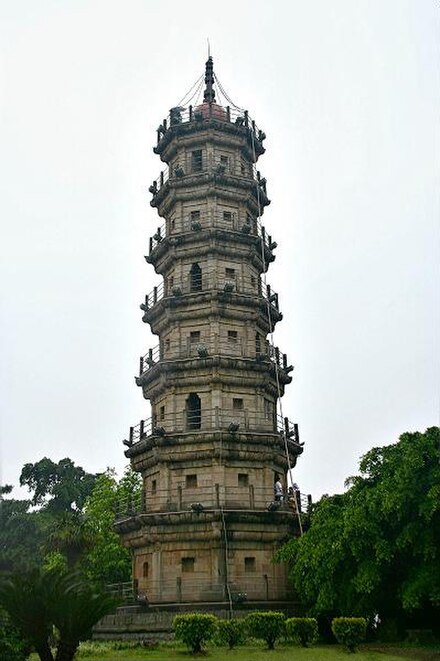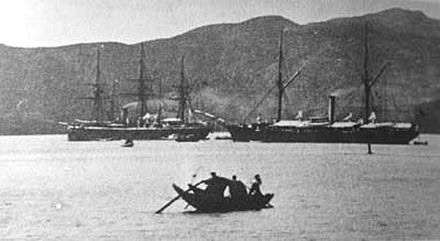Mawei - district of Fuzhou, Fujian, China
 Mawei (马尾) is in Southeast China, about 20 kilometres southeast of Fuzhou, downstream along the Min River. It is a small town by Chinese standards; its population was 170,000 in the 2010 census.
Mawei (马尾) is in Southeast China, about 20 kilometres southeast of Fuzhou, downstream along the Min River. It is a small town by Chinese standards; its population was 170,000 in the 2010 census.
To 19th-century seamen, what is now Mawei was Pagoda Anchorage and the pagoda was often the first conspicuously Chinese thing a sailor saw. In that period, Fuzhou shipped more tea than any other Chinese city and nearly all of the loading was done at Mawei.
Understand
Administratively, Mawei is a district of Fuzhou. It is the port area of Fuzhou, and has been a center of shipbuilding for centuries. Its name came from a legend that in the river there was a huge stone which looked like a horse (ma), whose tail (wei) was toward the town.
Get in
By plane
If you arrive via Fuzhou International Airport in Changle, Mawei is the midpoint on the way to downtown Fuzhou.
By ferry
- Fuzhou Port Mawei Passenger Terminal (福州港马尾客运站), Luoxing East Rd 77 (罗星东路77), +86 591-83268880. Ferries to Matsu, Taiwan every few hours.
By bus
Fuzhou Municipal Government has built a broad and beautiful avenue along the Min River. It now takes only 15 or 20 minutes to drive from downtown Fuzhou to Mawei. Taking a bus from Fuzhou is also possible; it is very cheap (only ¥1 one-way). The lines include Route 37, 58, 73 and 131.
Get around
The downtown area is small enough to make getting around on foot reasonable. There are also busses, taxis and (for the adventurous) motorcycle taxis.
See
 In the 19th century, Mawei was home to Foochow Arsenal, China's first modern naval shipyard with docks, a Naval School and other military facilities that were built to protect the arsenal. Nowadays, the relics of Foochow Arsenal are open for visitors. On the site of the arsenal, the new Mawei Shipyard is busy working everyday.
In the 19th century, Mawei was home to Foochow Arsenal, China's first modern naval shipyard with docks, a Naval School and other military facilities that were built to protect the arsenal. Nowadays, the relics of Foochow Arsenal are open for visitors. On the site of the arsenal, the new Mawei Shipyard is busy working everyday.
Not far from the arsenal, at the base of Maxian Mountain, there is a small memorial temple, Zhaozhong Temple, for those who fell in the battle of Fuzhou. on August 23, 1884. This was the opening battle of a Sino-French War, mainly over Chinese objections to France's expansion in what is now Vietnam, then a Chinese tributary state. While neutral American and British vessels watched, the French sank 9 of the 11 ships in the Chinese fleet, while losing only one torpedo boat. They then bombarded the dockyards and sailed away, pausing only to destroy all the Chinese forts downriver. At least 2000 Chinese lives were lost, and 10 French.
On Maxian Mountain, there are the sites of an English-style prison and the Maxian Mountain Mesoslope Battery, subordinate facilities of the Foochow Arsenal.
About two kilometres southeast of the Mawei Shipyard, is Luoxingta (Luoxing Pagoda). The government of Mawei District have built a beautiful park around it. Visitors can climb a small hill to reach the bottom of Luoxingta.
If traveling from Mawei Town to Langqi Island, then in Tianluowan, Minan and Tingjiang the visitors will find the relics of old batteries built in the Qing Dynasty, which were important part of the Minjiang defense line.
Langqi is a beautiful island located at the mouth of the Min River. People can enjoy swimming, sunbathing, surfing and other aquatic sports here. Also, the seafood is excellent.
Do
Because of Mawei's geographic location (on the bank of Min Jiang River and facing the East China Sea), it is a wonderful place for fishing and swimming.
There is a long walkway companied the avenue along the Min Jiang River. People can walk, jog or run on it.
Buy
A factory in Mawei makes shoes for Adidas and Reebok. There are some stores with cheap shoes, possibly factory seconds. Check quality carefully and bargain hard.
Shopping places include Huanyu Baihuo, Zhongshan Shangchang, and Xinrong Baihuo Shangchang.
Eat
Tianfu Restaurant: the best Szechuan style food in Mawei
Xinbada Coffee: mainly offering western style food
Shangdao Coffee: mainly offering western style food
Wanglou Restaurant: Fujian Cuisine and Seafood
Drink
Sleep
Mawei does not have many hotels. Some are:
- Banghui Hotel.
- Haishangmingzhu Hotel.
- Mawei Seamen's Club. It is also possible to stay in downtown Fuzhou.
Go next
- Wenfu Railway — from Fuzhou to Wenzhou.
- Airport Highway I & II — from Fuzhou to Changle International Airport.
- Shenhai Highway — northbound to Zhejiang and Shanghai, southbound to Guangdong.
- Cruise — from Mawei Port to Matsu Port and Taiwan Island; northbound to Shanghai, Qingdao, Tanggu and Dalian; southbound to Xiamen, Guangzhou, Hong Kong and Singapore.
Mawei District
mawei.gov.cnFuzhou Shi
2nd-order administrative division
Fujian
Primary administrative division